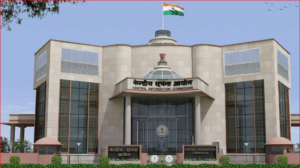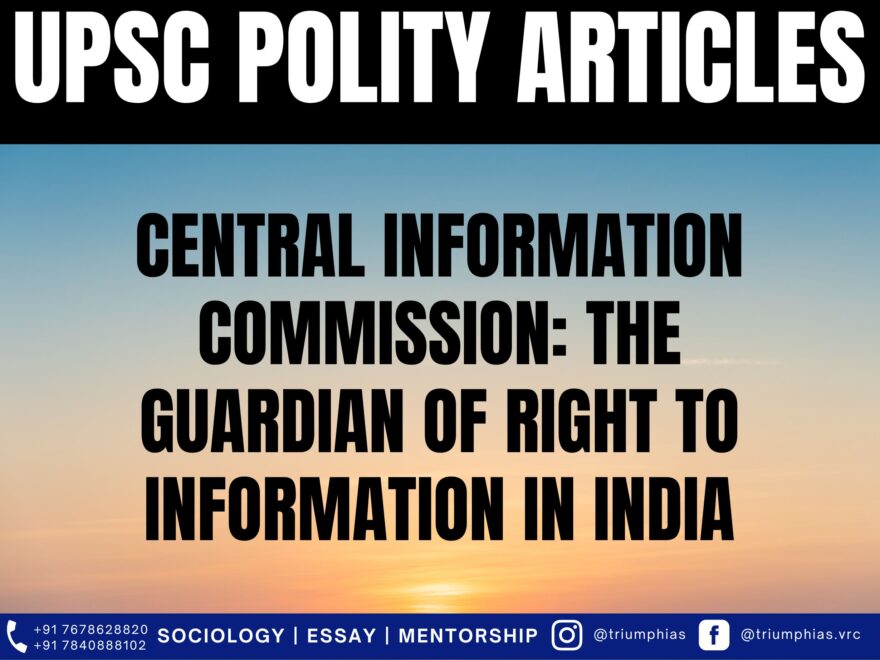Central Information Commission: The Guardian of Right to Information in India
(Relevant for Polity Section of General Studies Paper Prelims/Mains)

Central Information Commission
The Central Information Commission (CIC) is an established statutory entity formed by the Central Government in 2005, as per an Official Gazette Notification within the framework of the Right to Information Act (2005). This body holds a prominent and autonomous position, responsible for addressing lodged complaints and making determinations on appeals. The CIC handles grievances and appeals concerning various entities, such as governmental offices, financial institutions, and public sector enterprises, operating under the jurisdiction of the Central Government and Union Territories.
Powers and functions:
- The Commission holds the responsibility of receiving and investigating complaints from individuals who have encountered challenges in accessing information. This could be due to the absence of a designated Public Information Officer (PIO), denial of requested information, lack of response to information requests, disputes over charged fees, or concerns about incomplete, misleading, or false information. Furthermore, the Commission possesses the authority to initiate inquiries into matters supported by reasonable grounds (suo-moto power).
- During such inquiries, the Commission is endowed with the capabilities akin to those of a civil court. This includes the ability to summon and enforce the presence of individuals, compel them to provide oral or written testimony under oath, and produce pertinent documents or items. Throughout the course of a complaint’s investigation, all relevant public records are required to be furnished to the Commission.
- Additionally, the Commission wields the power to enforce compliance with its decisions by the concerned public authority. This encompasses various actions such as mandating the appointment of a Public Information Officer when absent, facilitating enhanced training for officials regarding Right to Information policies, requesting annual reports from public authorities to gauge compliance with the Act, and even imposing penalties in accordance with the RTI Act.
- In cases where a public authority fails to adhere to the provisions of the RTI Act, the Commission possesses the ability to recommend corrective steps that should be taken to align with the Act’s guidelines.
Challenges
- Central Government controlling its terms of office, salaries and allowances and other terms and conditions of service
- Non-compliance of CIC orders;
- No centralized database of RTI applicants at the Centre/State level
- Personnel and infrastructural constraints;
- High pendency of cases etc.
Any changes as brought through RTI Amendment Bill 2019 should not defeat the very purpose of installing this autonomous body that judges the correctness of governmental action in denying access to information.
Sample Question for UPSC Sociology Optional Paper:
1. Q: Briefly explain the role of the Central Information Commission (CIC) in enhancing social accountability.
A: The CIC plays a pivotal role in enhancing social accountability by ensuring transparency and access to information under the RTI Act. It acts as a watchdog that adjudicates on appeals and complaints, thereby holding governmental and public bodies accountable to the citizens.
2. Q: What challenges does the CIC face in executing its powers under the RTI Act?
A: The CIC faces challenges like central government control over its terms and conditions, non-compliance of its orders, lack of a centralized RTI applicant database, and constraints in personnel and infrastructure.
3. Q: How does the CIC contribute to promoting participatory democracy?
A: By facilitating access to information, the CIC empowers citizens to make informed decisions and engage meaningfully in the democratic process, thus promoting participatory democracy.
4. Q: What impact has the RTI Amendment Bill 2019 had on the autonomy of the CIC?
A: The RTI Amendment Bill 2019 has stirred debates about the possible dilution of CIC’s autonomy, particularly regarding the central government’s control over its terms of office, salaries, and allowances.
5. Q: Comment on the inclusiveness of the CIC in catering to various segments of society.
A: The CIC caters to a broad spectrum of society by addressing complaints and appeals not just from urban entities but also from marginalized groups, thereby making it an inclusive institution.
To master these intricacies and fare well in the Sociology Optional Syllabus, aspiring sociologists might benefit from guidance by the Best Sociology Optional Teacher and participation in the Best Sociology Optional Coaching. These avenues provide comprehensive assistance, ensuring a solid understanding of sociology’s diverse methodologies and techniques.
Central Information Commission, CIC, Right to Information, RTI Act, transparency, accountability, autonomous body, complaints, appeals, Public Information Officer, PIO, Government, RTI Amendment Bill 2019, challenges, powers and functions
Choose The Best Sociology Optional Teacher for IAS Preparation?
At the beginning of the journey for Civil Services Examination preparation, many students face a pivotal decision – selecting their optional subject. Questions such as “which optional subject is the best?” and “which optional subject is the most scoring?” frequently come to mind. Choosing the right optional subject, like choosing the best sociology optional teacher, is a subjective yet vital step that requires a thoughtful decision based on facts. A misstep in this crucial decision can indeed prove disastrous.
Ever since the exam pattern was revamped in 2013, the UPSC has eliminated the need for a second optional subject. Now, candidates have to choose only one optional subject for the UPSC Mains, which has two papers of 250 marks each. One of the compelling choices for many has been the sociology optional. However, it’s strongly advised to decide on your optional subject for mains well ahead of time to get sufficient time to complete the syllabus. After all, most students score similarly in General Studies Papers; it’s the score in the optional subject & essay that contributes significantly to the final selection.
“A sound strategy does not rely solely on the popular
Opinion of toppers or famous YouTubers cum teachers.”
It requires understanding one’s ability, interest, and the relevance of the subject, not just for the exam but also for life in general. Hence, when selecting the best sociology teacher, one must consider the usefulness of sociology optional coaching in General Studies, Essay, and Personality Test.
The choice of the optional subject should be based on objective criteria, such as the nature, scope, and size of the syllabus, uniformity and stability in the question pattern, relevance of the syllabic content in daily life in society, and the availability of study material and guidance. For example, choosing the best sociology optional coaching can ensure access to top-quality study materials and experienced teachers. Always remember, the approach of the UPSC optional subject differs from your academic studies of subjects. Therefore, before settling for sociology optional, you need to analyze the syllabus, previous years’ pattern, subject requirements (be it ideal, visionary, numerical, conceptual theoretical), and your comfort level with the subject.
This decision marks a critical point in your UPSC – CSE journey, potentially determining your success in a career in IAS/Civil Services. Therefore, it’s crucial to choose wisely, whether it’s the optional subject or the best sociology optional teacher. Always base your decision on accurate facts, and never let your emotional biases guide your choices. After all, the search for the best sociology optional coaching is about finding the perfect fit for your unique academic needs and aspirations.
To master these intricacies and fare well in the Sociology Optional Syllabus, aspiring sociologists might benefit from guidance by the Best Sociology Optional Teacher and participation in the Best Sociology Optional Coaching. These avenues provide comprehensive assistance, ensuring a solid understanding of sociology’s diverse methodologies and techniques. Sociology, Social theory, Best Sociology Optional Teacher, Best Sociology Optional Coaching, Sociology Optional Syllabus.
Best Sociology Optional Teacher, Sociology Syllabus, Sociology Optional, Sociology Optional Coaching, Best Sociology Optional Coaching, Best Sociology Teacher, Sociology Course, Sociology Teacher, Sociology Foundation, Sociology Foundation Course, Sociology Optional UPSC, Sociology for IAS,
Follow us :
🔎 https://www.instagram.com/triumphias
🔎https://www.youtube.com/c/TriumphIAS
https://t.me/VikashRanjanSociology
Find More Blogs
|
Scope of the subject and comparison with other social sciences |
|||
|
|
|
|
Modernity and social changes in Europe |

